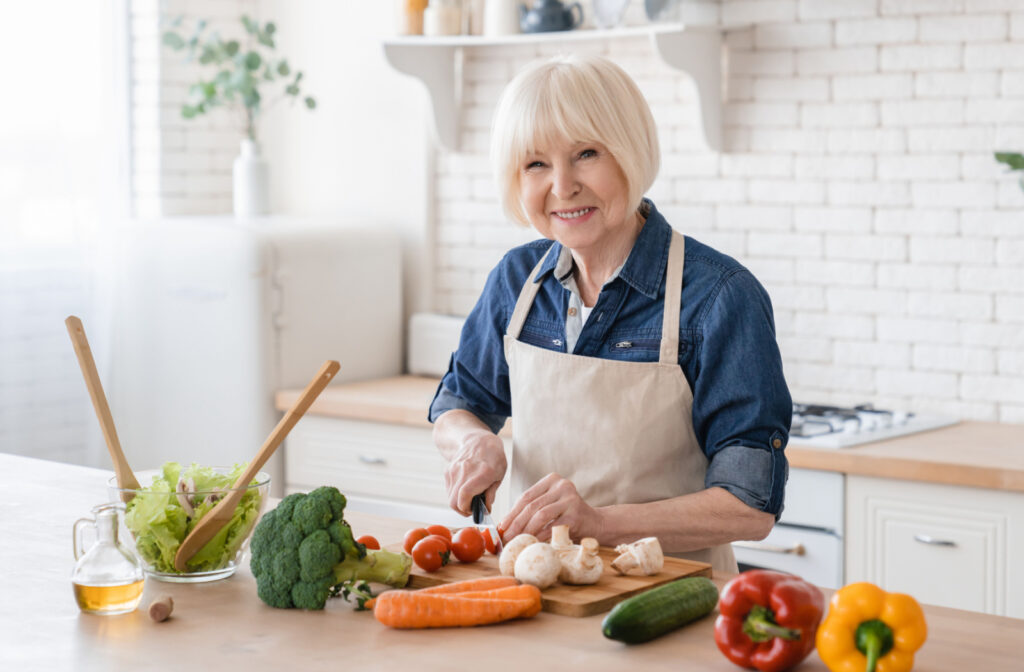As we grow older, maintaining a healthy diet can become more important than ever. Eating the right foods can provide the nutrients and energy seniors need to stay active and independent. However, it’s also important to know the foods seniors should avoid to maintain their overall health and well-being.
Some of the foods seniors should avoid include:
- High-sodium foods
- Processed and sugary foods
- Foods with trans fat and saturated fat
- Foods with potential choking hazards
Seniors may also experience changes in their body’s ability to process certain foods, such as lactose or gluten, leading to other necessary diet changes based on personal health factors.
Here at Parsons House Cypress, we take pride in providing tailored dietary guidance for our residents. We work with licensed dieticians to create menus that offer a variety of nutritious and delicious options for specific dietary needs and lifestyle preferences.
Understanding the Importance of a Healthy Diet for Seniors
As we age, proper nutrition can become increasingly crucial for our overall well-being. Eating well-balanced meals is essential for maintaining overall wellness and preventing chronic illnesses.
A healthy diet is vital for maintaining energy levels, and seniors need foods that provide the right balance of nutrients to keep them energized throughout the day. Your diet can also play an important role in preventing diseases such as heart disease, strokes, and diabetes. Eating the right types of foods can help lower the risk of these diseases and improve overall health.
A diet that includes plenty of fruits, vegetables, whole grains, lean protein, and healthy fats is essential for optimal health. Additionally, seniors should limit their intake of foods high in saturated fats, sodium, and added sugars, as these can increase the risk of chronic diseases.
Which Common Foods Can Cause Issues for Seniors?
In addition to eating enough of the right types of foods, seniors should avoid certain foods that can be harmful to their health. Specific dietary needs can vary from person to person, but the following foods are some of the common foods that may cause issues for seniors.
High-Sodium Foods
Seniors who consume excessive sodium may face a higher risk of heart disease, strokes, and other chronic conditions. The American Heart Association recommends a daily limit of 1500mg of sodium or less for seniors.
Common high-sodium foods include processed meats like bacon and ham, canned soups, pickles, and certain condiments like soy sauce. These foods can lead to water retention, which can lead to high blood pressure and other complications.
Alternative options include consuming fresh fruits and vegetables, using herbs and spices instead of salt for flavor, and choosing low-sodium versions of food products.
Processed & Sugary Foods
Eating processed and sugary foods can lead to obesity, type 2 diabetes, and other chronic diseases. It is important to limit these types of foods at all ages, including older ages.
Processed foods are often high in salt, fat, and sugar—ingredients that can lead to health complications. Sugary foods, like candy and sweet baked goods, can lead to spikes in blood sugar and related health concerns.
Healthier options include fresh fruits and vegetables, lean meats, whole grains, and low-fat dairy products. These foods can offer more vitamins and minerals, help seniors maintain a healthy weight, and reduce the risk of diseases like diabetes.
Trans Fat & Saturated Fat
Saturated and trans fats can increase “bad” cholesterol levels, which can lead to heart disease and strokes. Trans fats are usually found in processed foods, while saturated fats are commonly found in animal-based foods.
Foods high in trans fats include fried foods, baked goods like doughnuts, and certain varieties of margarine. Foods high in saturated fats include fatty cuts of meat, butter, and cheese.
Healthier fat options include unsaturated fats, such as those found in nuts, seeds, and avocados. These foods can help increase “good” cholesterol levels and reduce the risk of heart disease.
Foods with Potential Choking Hazards
Seniors can be at an increased risk of choking, so it is important to be mindful of the textures and sizes of the foods you and your family consume. Foods that are harder to chew or swallow can potentially get stuck in the throat or cause other complications.
Common choking hazards include:
- Popcorn
- Nuts
- Hard candies
- Raw vegetables
- Chunks of meat
- Small bones
To avoid these hazards, seniors can modify food textures by cooking vegetables until they are soft or opt for safer alternatives, like nut butter instead of nuts. It’s also important to chew food thoroughly, and it may be helpful to avoid talking during meals.
Nutritious Meals for Seniors at Parsons House Cypress
At Parsons House Cypress, we understand the importance of proper nutrition for seniors. With 40 years of experience as a family-led community, we have developed a tailored approach to meet each of our resident’s specific dietary needs and preferences.
Our culinary team is passionate about creating exciting menus that are not only healthy but also flavorful. We strive to use seasonal and locally sourced ingredients to provide fresh and nutritious meals. Our commitment to quality, nutritious, and delicious meals is unwavering, and we are always happy to answer any questions or address any concerns you may have. Please reach out to us for more information about our services or to schedule a tour of our community.


